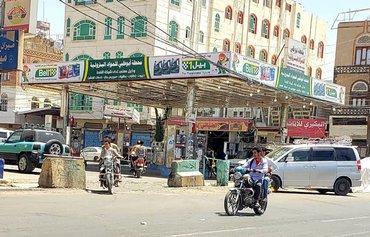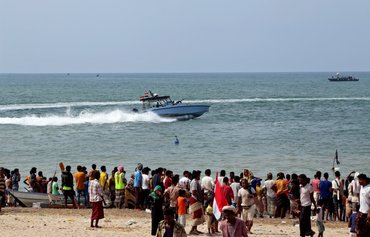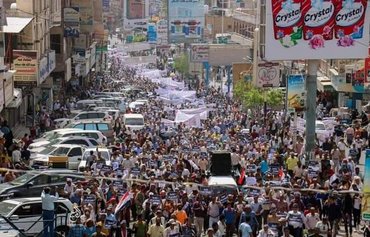ADEN -- Extending the humanitarian truce in Yemen for a third time will ameliorate the impact of the war on ordinary inhabitants, including the internally displaced population, international and local officials said.
The truce will build confidence between the warring sides and move the country towards a comprehensive ceasefire and an end to the war, they said.
United Nations (UN) Yemen envoy Hans Grundberg said he has intensified his engagements with all parties to support the implementation of the truce, and to explore possibilities to extend it beyond August 2.
"An extended and expanded truce will increase the benefits to the Yemeni people," Grundberg said in a July 21 statement.
![Yemeni demonstrators in Taez protest on July 26, demanding the end of a years-long blockade of their city, Yemen's third largest, imposed by the Houthis. [Ahmad al-Basha/AFP]](/cnmi_am/images/2022/07/28/36402-Houthis-Yemen-Taez-600_384.jpg)
Yemeni demonstrators in Taez protest on July 26, demanding the end of a years-long blockade of their city, Yemen's third largest, imposed by the Houthis. [Ahmad al-Basha/AFP]
The first humanitarian truce went into effect April 2, and was extended on June 2 for a further two months.
The UN envoy seeks to have it extended for another six months, starting August 2.
A ceasefire extension "will provide a platform to build more confidence between the parties and start serious discussions" on economic and security priorities, he said.
"Ultimately, the aim is to move toward a political settlement that comprehensively ends the conflict," Grundberg said.
The truce has largely held for almost four months, marking the longest period of relative calm in more than seven years, he added.
The number of civilian casualties has decreased significantly as a result of the truce.
Challenges remain
However a number of challenges remain in the implementation and continuation of the truce.
The prolonged closure of roads linking the city of Taez, which is under Houthi blockade, with the rest of the country, is a particular bone of contention.
Holding talks on Taez was one of the terms of the truce between the warring sides. Yet the roads remain blocked, and the ongoing closures have become a catalyst for near-daily demonstrations against the group.
On Sunday (July 24), Houthi shelling of a neighbourhood in Taez killed at least one boy and injured 11 other children, most under the age of 10, according to the UN and Mwatana, a human rights group, the Washington Post reported.
The incident raised additional fears about the viability of the truce, with some pro-government demonstrators on Tuesday protesting also against the extension on the grounds that the Houthis cannot be trusted, according to a report published by Asharq al-Awsat.
Protesters said in a statement that the Houthis "do not believe in peace and do not fulfill their pledges", the media outlet said.
Houthis are taking advantage of the truce in Yemen to step up their recruitment and mobilisation efforts, recently announcing the graduation of more than 5,000 fighters, officials and analysts have said.
"I will not stop pursuing my efforts to bring the parties closer together to reach agreement to sustainably and safely open key roads in Taez and other governorates," Grundberg said.
"This will remain a priority for this truce period and any future extension of it."
The Yemeni people and the international community want and expect the truce to be fully implemented, renewed and strengthened, said Grundberg.
Support for truce
On July 20, Yemen's new Presidential Command Council evaluated the effectiveness of the humanitarian truce.
The council reiterated the government's commitment to support the work of the UN envoy and all regional and international endeavours to bring peace to Yemen but noted the extensive violations committed by the Iran-backed Houthis.
US envoy to Yemen Tim Lenderking reiterated his country's support for the peace efforts in Yemen during a meeting with Grundberg earlier this week in Amman, the Jordanian capital.
The Arab coalition also announced its support for extending the truce and its approval of measures that help establish it, noting that air strikes have halted since the truce went into effect.
The Presidential Command Council has said that "we are with any truce whose main aim is the demonstration of good faith towards a just and lasting peace", said Deputy Minister of Legal Affairs and Human Rights Nabil Abdul Hafeez.
"We are now on the cusp of the expiration of the second humanitarian truce, and what happened during the two truces does not give positive indications of good faith from the Houthi side," he told Al-Mashareq.
The truce is needed to prevent more civilian victims, said Salem Mohammed, who works for the Yemen al-Khair organisation in al-Jawf province, noting that the fighting has left thousands dead and wounded over the past seven years.
Because of a lack of funding, Al-Khair has begun to reduce the amount of aid provided to displacement camps in al-Jawf for civilians who fled Hajjah, Saada, Marib and al-Hodeidah provinces, he told Al-Mashareq.
The support provided to internally displaced persons (IDPs) includes food baskets and clothing, tents and mattresses, and cash support, he said.
The situation in the camps is deteriorating steadily as a result of the decline in aid and the protracted war and displacement, "and if this situation continues, the humanitarian tragedy will redouble", said Mohammed.
Humanitarian impact
It is of vital importance for the future of Yemen that the international community exert pressure on the Houthis to adhere to the terms of the truce, Mohammed said.
Donors also need to be encouraged to provide for the essential needs of the country's displaced population, especially in the case of vulnerable groups hardest hit by the continuation of the war, he said.
Economist Abdul Aziz Thabet pointed to the importance of the truce extension, telling Al-Mashareq it will ease the burden on the Yemeni people.
"The UN envoy's data confirmed the entry of 26 ships carrying oil derivatives during the four-month period of the truce, while only 23 such ships entered [Yemeni ports] last year," he said.
"This underscores the importance of extending the truce to make these derivatives available and lower their prices, which will have a positive impact on citizens," Thabet said.
He pointed to the Houthis' unilateral reopening of certain key Taez roads in light of protests of their initial blockade.
"They announced the opening of a secondary road, the 50-60 road, for a military purpose, namely to take control of the military camps near this road," he said -- a move that only highlights their refusal to reopen other roads.
He called on the UN to urge the Houthis "to commit to extending the truce and opening roads in Taez and other provinces to ease the burdens and suffering of citizens".

![Yemeni demonstrators in Taez protest on July 26, demanding the end of a years-long blockade of their city, Yemen's third largest, imposed by the Houthis. [Ahmad al-Basha/AFP]](/cnmi_am/images/2022/07/28/36401-Yemen-Houthis-blockade-600_384.jpg)






